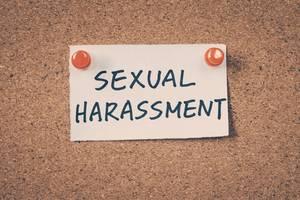
 847-995-1205
847-995-1205
Congress Poised to Approve New Workplace Sexual Harassment Bill
 Several years ago, the #MeToo movement exploded across the country following multiple accusations of sexual abuse allegations against film producer Harvey Weinstein. The surge of women and men who came forward to share their stories of sexual assaults, abuse, and harassment permeated almost every industry and workplace. As a result of that movement – and demand for change – the United States House and Senate both have bills that will likely be voted on within the next few weeks, if not days.
Several years ago, the #MeToo movement exploded across the country following multiple accusations of sexual abuse allegations against film producer Harvey Weinstein. The surge of women and men who came forward to share their stories of sexual assaults, abuse, and harassment permeated almost every industry and workplace. As a result of that movement – and demand for change – the United States House and Senate both have bills that will likely be voted on within the next few weeks, if not days.
The bills would allow employees to sue their employers over workplace sexual harassment or assault no matter what type of contractual restrictions there may be between the two. The bills have bipartisan support and are expected to pass in both chambers.
Workplace Sexual Harassment
According to the Equal Employment Opportunity Commission (EEOC), sexual harassment can affect men or women and includes a variety of different actions and attitudes meant to threaten, intimidate, embarrass, or discriminate others. It may involve physical contact, such as assault or groping, as well as comments, gestures, and other discriminatory behaviors.
Although some situations offer clear-cut evidence of inappropriate behavior, there are likely still many people hiding behind the defense that their attitudes, actions, or comments are ‘just a joke' and not intended to offend or violate the rights of anyone.
While it is against the law, sexual harassment frequently happens in the workplace and often involves coworkers who may not even be aware that their behavior or their attitudes are offensive to others. Regardless of their motives, individual perpetrators of sexual harassment and employers can be held liable for creating a hostile work environment through a civil claim for damages, particularly if they are aware that the condition exists and do nothing to address it.
Signs That Sexual Harassment May Be a Problem in Your Company
The following are some signs that an employee is subjecting another employee to sexual harassment and could leave your company liable in any legal action filed by an employee who alleges he or she is a victim of workplace sexual harassment:
-
There is behavior occurring that makes an employee uncomfortable. This may include a coworker or manager who stands too close, requests repeatedly that the employee meet them after work, or insists on telling the employee about their own sexual experiences.
-
There are behaviors the employee does not feel comfortable with but feels pressured to go along with. Examples include a supervisor or other superior who makes comments about the employee's appearance or groups of coworkers who gather near the employee's work area, laughing and trading stories about sexual matters.
-
There are behaviors the employee is not able to make stop. This includes a co-worker who continues telling ‘dirty' jokes despite the employee's requests to stop or when their boss fails to address previous complaints.
Call an Illinois Employment Lawyer Today
If you have an employee who has filed a complaint alleging sexual harassment, your company could be held liable, facing fines and/or lawsuit damages. Call The Miller Law Firm, P.C. at 847-995-1205 to speak with a skilled Schaumburg, IL workplace sexual harassment attorney and find out what legal options you may have.
Sources:
https://news.bloomberglaw.com/daily-labor-report/sexual-misconduct-bill-inspired-by-metoo-bound-for-final-votes
https://www.eeoc.gov/laws/types/sexual_harassment.cfm
Contact Us


Schaumburg, IL 60173
Phone: 847-995-1205
